Acharya strives for excellence throughout academic journey
Senior Meghana Acharya works in science teacher Doug Petty’s third hour physics class. She solves a problem presented on the board during a lesson. Physics has been one of the more challenging courses that she has taken, Acharya describes.
November 30, 2019
Half a serotonin molecule, an eye set in a sun and a one-line sketch of a face. All of these designs are set in ink on her skin. The tattoo that holds the most significance for senior Meghana Acharya, however, runs sturdy and unfaltering along her left forearm: a pencil.
“I’ve written my whole life. Short stories, poetry. It was like an escape for me. It gave me comfort through some very difficult times in my life,” Acharya explained. “I use writing as a coping mechanism sometimes, and it helped me sort my emotions, get my emotions out when I felt kind of overwhelmed by them. So writing’s been very important for me, and that’s why I got that tattoo.”
Acharya’s values stand out from those of the majority of her peers. While many other teens and young adults prioritize sports, popular culture and technology, she values something that often goes overlooked and taken for granted: learning.
I’ve written my whole life. Short stories, poetry. It was like an escape for me. It gave me comfort through some very difficult times in my life.
— Meghana Acharya
“I’ve always taken classes that I’m really interested in,” Acharya explained. “So even though it was like, the usual ‘I don’t want to do homework’, you know that sort of thing, but when the course material really interests me, I really like learning. I’ve always tried really hard in school because I know that’s important, and I’m grateful for that because now I’ve set a really solid groundwork for myself.”
This drive to succeed in school is evident in Acharya’s academic performance. In September, she was announced as a semifinalist in the National Merit Scholarship Program, with an exceptionally high score on the 2018 PSAT/NMSQT (Preliminary SAT/National Merit Scholarship Qualifying Test). From here she will continue up the National Merit path, vying for the subsequent title of “finalist” and possibly even the prestigious “scholar.” As a finalist, a student becomes eligible for National Merit Scholarships of $2,500, as well as various corporate- and college-sponsored scholarships.
“It’s kind of unique and unusual for students to qualify,” Acharya’s counselor Jennifer Prestegaard explained. She described the experience of another National Merit qualifier whom she counseled: “A different kind of tier of schools really became kind of interested in her academics and then her transcript, because that test score really stands out…I think it just kind of really opens up different possibilities for students, and so maybe if they thought they had this particular plan, they can really look deeper and expand their search quite a bit.”
Preparations for success
While Acharya’s high test score is definitely impressive, even more so is the fact that she did not really have to study. She never truly prepared for that test specifically, she explained. In fact, she almost ended up not taking it because her “mom just forgot to sign me up.”
“I just tried my best, I guess a year worth of like school stuff pushed me high enough. I just took it and didn’t expect anything to come of it,” Acharya explained. “I just took it and I was like ‘A’ight, that’s another test I have done.’ And then I got a letter like, a month ago, and I was like, ‘Oh, okay, so I did pretty well on this test.’”
Though Acharya may not have studied specifically for the PSAT/NMSQT, she did prepare through applying herself in her many AP classes and rigorous courses, she explained. Prep for that previous year’s workload of three AP classes taught her “how to take tests”—she became more comfortable and confident with pacing, timing and powering through exams.
Chemistry teacher Lynn Swanson taught Acharya two years ago in one of Acharya’s favorite classes, AP Chemistry. She highlights the significance of those test-taking skills taught in her AP Chem class.
“While we’re learning Chemistry, we also spend some time on test-taking strategies, and I would like to believe that those strategies lend themselves to other standardized tests,” Swanson explained. “Eliminating wrong answers, for example. That’s something we would do—we’d practice multiple choice and say, ‘This one doesn’t even make sense’, and eliminate that, and I think you could do the same thing on a PSAT.”
Motivations for excellence, pressure overseas
While Acharya is unique in her extraordinary academic performance on such exams, earning the coveted score of a ‘5’ on all but one of the seven AP classes she has taken so far in high school, she is also set apart from her peers by her commitment to learning and her studies in general. A large part of it stems from a sense of perfectionism, but there isn’t just one driving factor.
“Part of it is anxiety,” Acharya reflected. “Because I had this feeling that if I wasn’t perfect, if I didn’t do incredibly, I wasn’t good enough. And that was part of it, but another part of it was, I like academics, and I wanted to do the best I could. It was driven by anxiety and my own high standards.”
Here, emphasis isn’t put completely on grades. Like a kid’s value or worth doesn’t come from their grades, but in India it seemed that way. It was much more strenuous there…I was taught through second to fifth grade that you need to get 100 percent, anything less isn’t good enough.
— Meghana Acharya
“I know I have the capacity,” Acharya added. “I’ve always known if I try, I can get an ‘A’. And so knowing that, I would be disappointed in myself if I didn’t get that ‘A’, because I knew I’d be capable of it.”
This feeling Acharya describes of needing to be perfect and maintain impeccable grades is something that she largely attributes to her time spent in the Indian educational system. Acharya and her younger brother were both born in the United States, she explained, but in 2009, her family moved to India to be closer to her grandparents and extended family. The experience would have a major impact on a young Acharya, who would later grow up to feel the full force of the values instilled in her overseas.
“It was a huge shift for me, because the schooling system is much different,” Acharya recalled. “Here, emphasis isn’t put completely on grades. Like a kid’s value or worth doesn’t come from their grades, but in India it seemed that way. It was much more strenuous there…I was taught through second to fifth grade that you need to get 100 percent, anything less isn’t good enough.”
Facing the misperceptions and persevering for the future
Moving back to school in the United States was much easier, Acharya described. She found that the system was much more relaxed than it had been in India, so “it made it easier to excel, to do really well.” However, this idea can begin to breed a dangerous misconception.
“The biggest stereotype is that it’s just easy,” Prestegaard explained. “I think a lot of times, people don’t see, for those students who are working really, really hard, they don’t see all the work that goes into it. And they don’t see the things that they’re kind of giving up, you know, to get those grades and have that success.”
“When I visited Stanford University, and I toured the campus, they talked a little bit about how the kids that go to Stanford are a little bit like ducks floating on the water,” she added. “Like ducks, if you were to see them, they look really calm, and they look like they’re just chillin’ out. But if you were to look under the water, their legs are kicking so furious and fast.”
For Acharya, this analogy rings true.
“I think the last two years I sacrificed my mental health for a lot,” Acharya described. “I would work too hard, I would push myself too far, and I’d burn out a lot. I would kind of collapse…I would be exhausted emotionally, and so it wasn’t sustainable. And that’s a thing that I think is important, that people think that I did it, and I was just smart, and it was easy to do. But it wasn’t easy to do. It took a lot of effort.”
The effort, the perfectionism, the personal hardships that have challenged her, all condense into the burden Acharya bears. It is a burden that she will carry with her throughout her educational journey, like the little meanings of ink she has etched on her body. The burden, although a part of her, does not define her. Her journey is a hopeful and bright one, broadened by her hard work, dedication and diligence. Acharya explained her hopes for her future. She is considering a slew of colleges for further study, and wants to major in psychology and minor in neuroscience to ultimately become an adolescent psychologist. So while the burden is there, it can never hope to hold her back.
“Still here. Still fighting,” Acharya said.



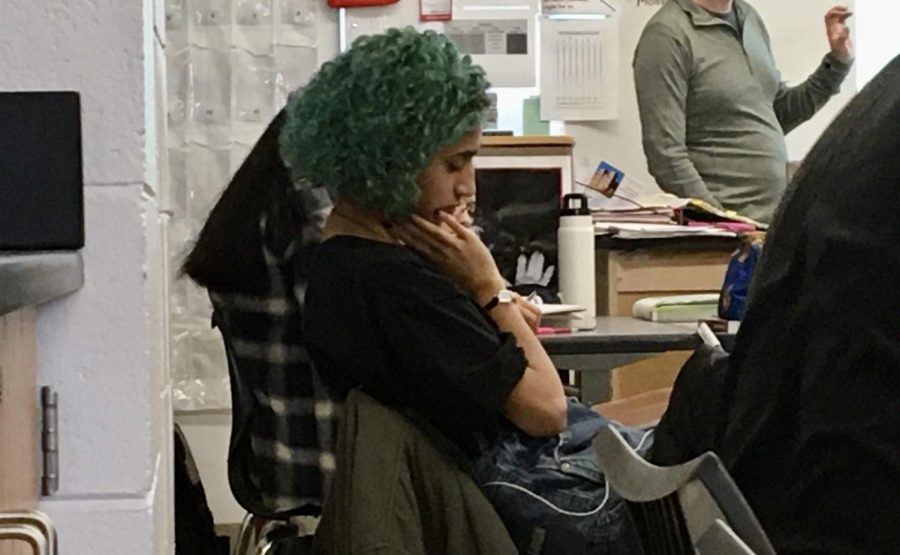


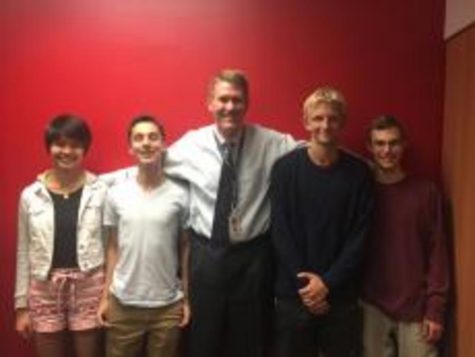




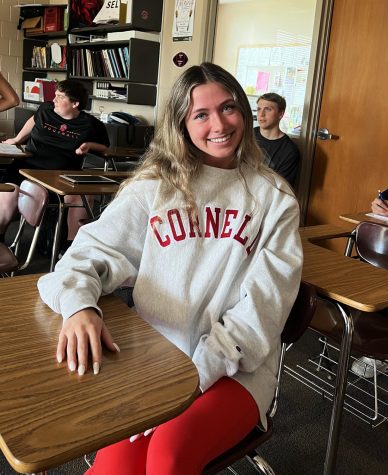

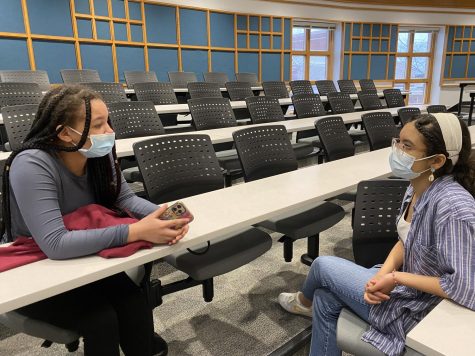
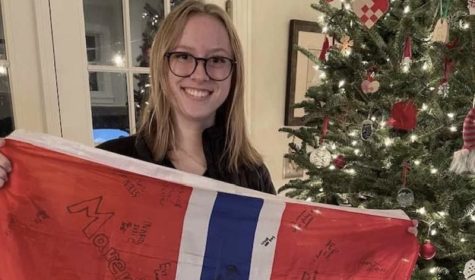

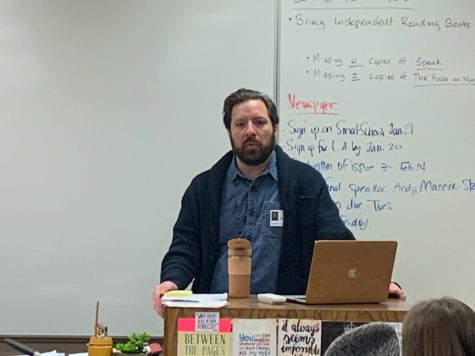
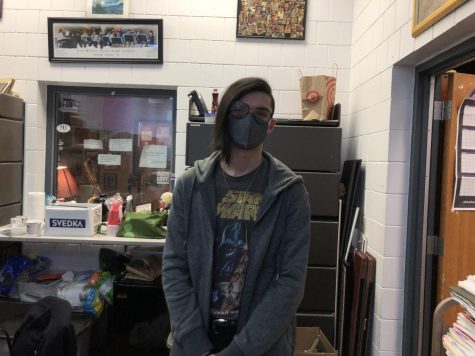
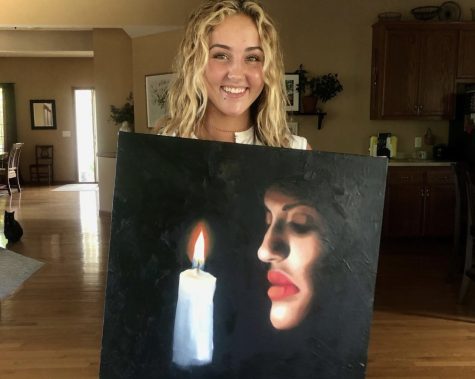


Elaina Mankowski • Dec 18, 2019 at 11:27 am
This article was really well written. I felt the quotes helped the article hold so much meaning. I think your writing really helped convey her story and the message it held. Amazing!
Elle Guggenberger • Dec 10, 2019 at 8:21 pm
This article is amazingly well written. The quotes from Acharya add so much meaning to the story. She really went into detail about how she felt at certain points and how much of a toll it took on her health, which I think is something a lot of people don’t realize. The questions to evoke these answers must have been super specific and well thought out. Had the questions been vague, I don’t think the story would have as much emotion as it does. Wonderful job on this article!
Alexis Brainard • Dec 6, 2019 at 8:50 pm
This article stood out to me because it talks about someone that wants to strive in school and that is something that is interesting to me. The language used in this article is way different than what I have seen in past articles and most articles that I read. It is nice to see something different for a change and not the same old words in every article. The quotes that were used really express Acharya’s feelings and really give a mood and point of view. The angle of this article was spot on with the title and head on of what the story is about. Sandy really covered this article well, way better than I would have myself. Great job!
Alex Steil • Dec 6, 2019 at 3:16 pm
This was a wonderfully written article. I could tell every question was thorough, and that you worded really hard on this article. Part of the reason it is so good is the subject and her perseverance, but the other part of its success was the writing employed throughout.